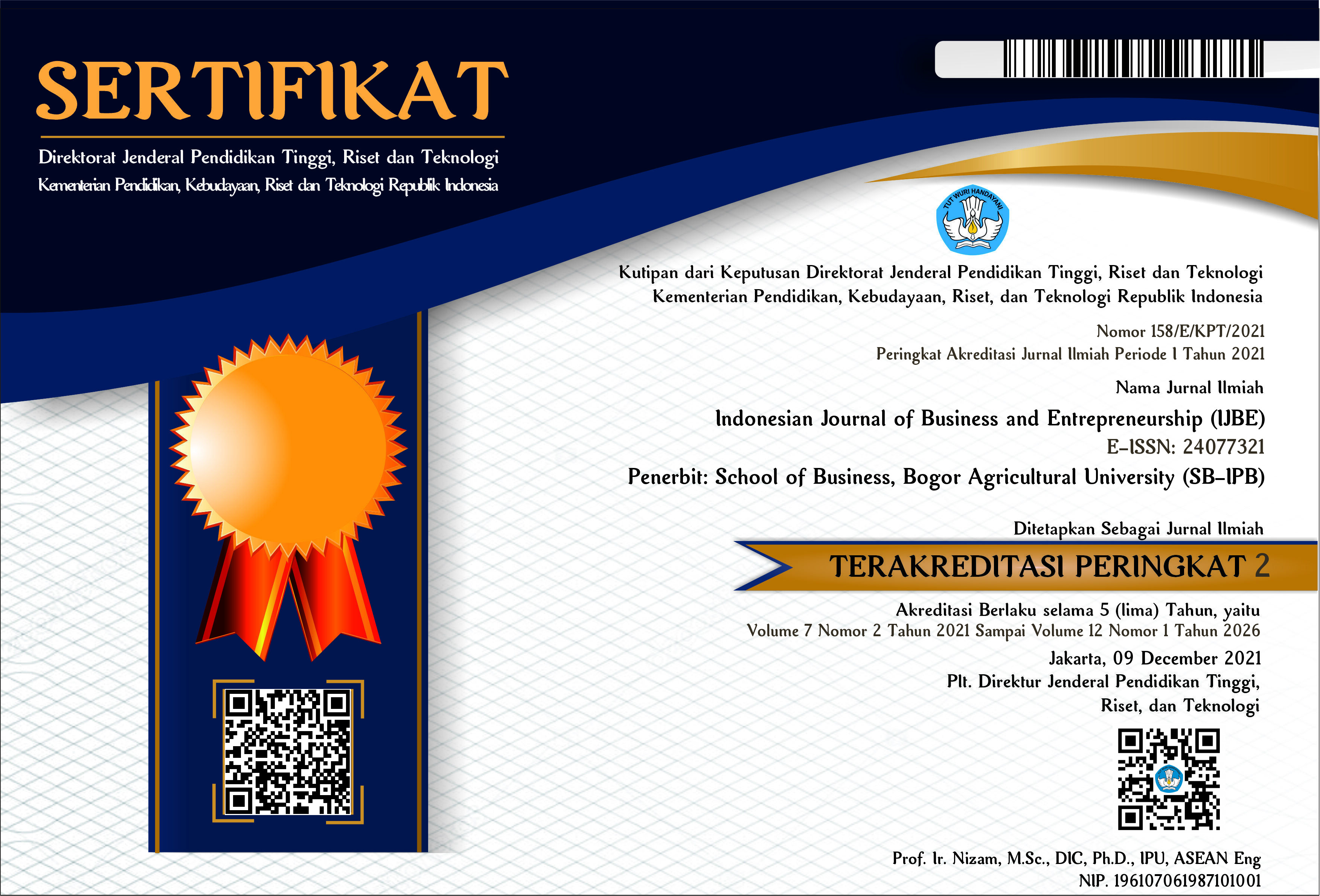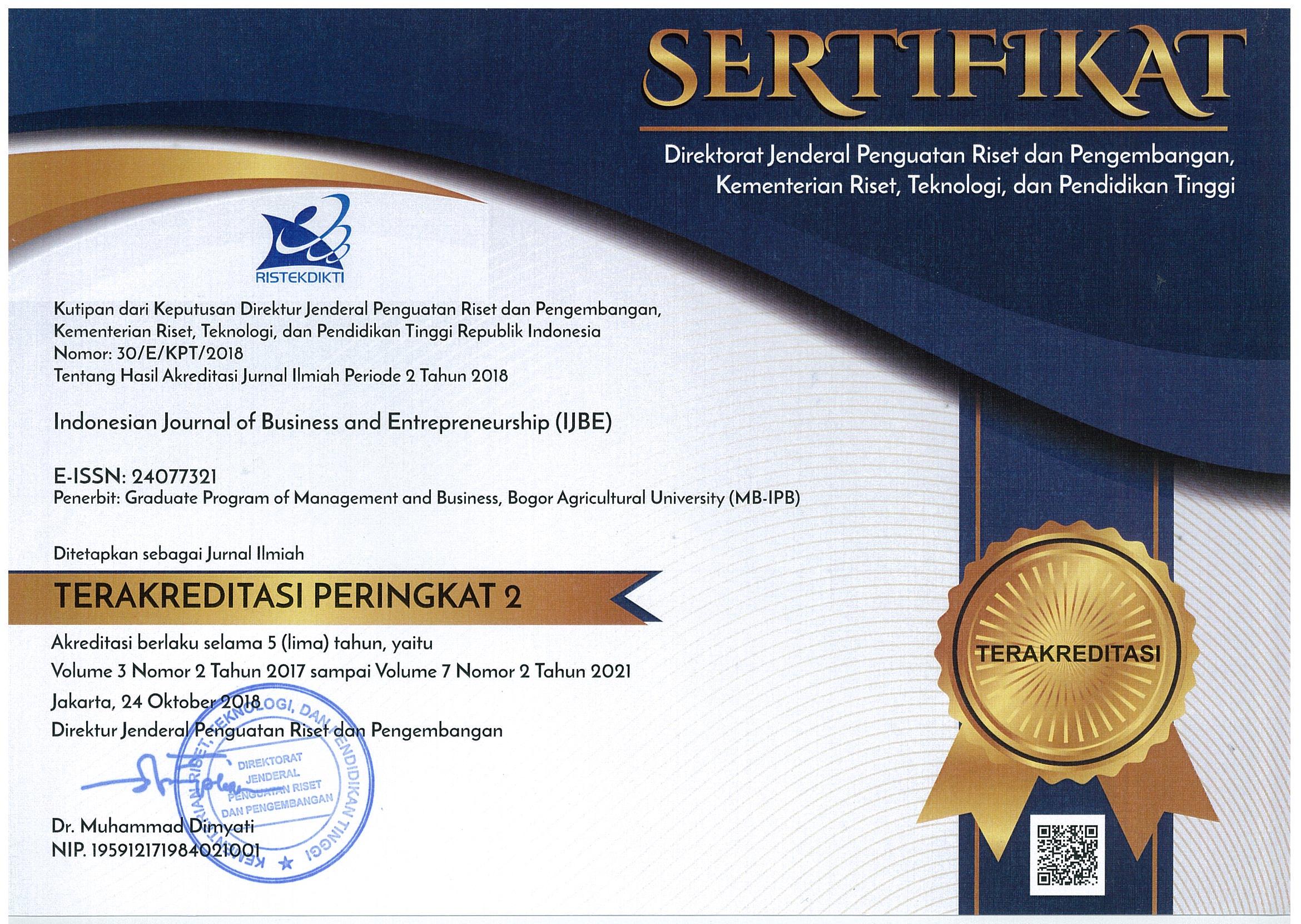AN ANALYSIS ON CUSTOMER SATISFACTION, TRUST AND LOYALTY TOWARD ONLINE SHOP (A CASE STUDY OF TOKOPEDIA.COM)
Abstract
In reference to the results of national research conducted by the Association of Internet Service Providers Indonesia (APJII) in cooperation with PusKaKom UI, the number of internet users (88.1 million) and its penetration (34.9%) in Indonesia has gradually increased. Also, the research identifies the issues of satisfaction, trust and loyalty in online shopping. The presence of actors in e-commerce business benefits the customers to personally choose the site to shop. The strategies to keep customer satisfaction trust and loyalty on one site challenge the actors in the business. In this regard, this paper examines customer satisfaction, trust and loyalty in online shopping in reference to the Quality User Interface (UIQ), Information Quality (IQ), Perceived Security Risk (PSR) and Perceived Privacy (PP) variables with case studies On Tokopedia.com. The study was conducted with 211 respondents by using self-administrated questionnaires in Survey Monkey platform in Jakarta and Bogor. The data were analyzed by using Structural Equation Modeling (SEM). Thus, the results show that the variables of UIQ, IQ, PSR and PP have an influence on satisfaction and trust. The variable of satisfaction has an influence on trust. However, these variables have no direct influence on loyalty.
Keywords: e-commerce, satisfaction, trust, loyalty, SEM
ABSTRAK
Hasil riset nasional yang dilakukan oleh Asosiasi Penyelenggara Jasa Internet Indonesia (APJII) bekerjasama dengan PusKaKom UI, pengguna internet Indonesia (88.1 juta) dan penetrasinya (34.9%) mengalami peningkatan. Namun, dari riset juga ditemukan bahwa adanya isu-isu kepuasan, kepercayaan dan loyalitas dalam berebelanja online. Adanya banyak pelaku dalam bisnis ecommerce membuat konsumen memiliki keuntungan untuk memilih situs yang menjadi tempat berbelanja. Bagaimana membuat konsumen terpuaskan dan percaya sampai dengan setia pada satu situs menjadi tantangan para pelaku bisnis. Sehubungan dengan hal tersebut, tulisan ini akan meneliti kepuasan, kepercayaan dan loyalitas konsumen dalam berbelanja online yang ditnjau dari variabel User Interface Qualiy (UIQ), Information Quality (IQ), Perceived Security Risk (PSR) dan Perceived Privacy (PP) dengan studi kasus pada Tokopedia.com. Penelitian dilakukan dengan 211 responden menggunakan self-administrated questionnaire dengan platform SurveyMonkey di Jakarta dan Bogor. Analisis data menggunakan Sturctural Equation Modeling (SEM). Hasil menunjukan bahwa variabel UIQ, IQ, PSR dan PP mempunyai pengaruh terhadap kepuasan dan kepercayaan. Variabel kepuasan mempunyai pengaruh terhadap kepercayaan. Namun variable tersebut tidak berpengaruh langsung kepada loyalitas.
Kata kunci: ecommerce, kepuasan, kepercayaan, loyalitas, SEM
Downloads
References
Alexa. 2016. Top sites in Indonesia. http://www.alexa.com/topsites/countries/ID [ 1 Oktober 2016]
Asosiasi Penyelenggara Jasa Internet Indonesia. 2014. Profil pengguna internet Indonesia 2014.https://apjii.or.id/download/file/profil-pengguna internetindonesia2014.pdf [1Juni 2015].
Brendon CF. 2002. In ecommerce, customer trust is no longer an option: it is the requirement for success. Annual Quality Congress Proceedings; 2002 May; Denver, Colorado. Denver: American Society for Quality
Cyr D. 2008. Modeling Website design across cultrues: relationship to trust, satisfaction and e-loyalty.Journal of Management Information Systmes 24(4):47–72. https://doi.org/10.2753/MIS0742-1222240402.
Dong-Her S, Hsiu-Sen S, Chun-Yuan C, Lin B. 2004. Internet security: malicious e-mails detection and protection. Industrial Management & Data Systems 104(7):13–23. https://doi.org/10.1108/02635570410550278.
Eid MI. 2011. Determinants of e-commerce customer satisfaction, trust and loyalty in Saudi Arabia.Journal of Electronic Commerce Research 12(1):78–93.
Ferdinand A. 2002. Structural Equation Modelling Dalam Peneltian Manajemen. Edisi 2, Seri Pustaka Kunci 03/BP . Semarang: UNDIP.
Fisher A. 2001. Winning the battle for customers. Journal of Financial Sevices Marketing 6(2):77–93. https://doi.org/10.1057/palgrave.fsm.4770042.
Flavia’n C, Guinaly’u M. 2004. Customer trust, perceived security and privacy policy: three basic elements of loyalty to a website. Industrial Management & Data Systems 104(9):744–755.
Hoffman D, Novak T. 2000. How to acquire customers on the web. Harvard Business Review 78(3):179–185.
Istijanto. 2005. Riset Sumber Daya Manusia. Jakarta: PT. Gramedia Pustaka Umum.
Kolsaker A, Payne C. 2002. Engendering trust in e-commerce: a study of gender-based concerns.Marketing Intellingence & Planning 20(4):206–214. https://doi.org/10.1108/02634500210431595.
Park C, Kim Y. 2003. Identifying key factors affecting consumer purchase behavior in an online shopping context. International Journal of Retail & Distribution Management 31(1):16–29. https://doi.org/10.1108/09590550310457818.
Nazir M. 1988. Metode Penelitian. Jakarta: Ghalia Indonesia.
Reichheld F, Schefter P. 2001. E-loyalty: your secret weapon on the web. Harvard Business Review 78(4): 105–115.
Wijanto SH. 2008. Structural Equation Modeling dengan Lisrel 8.8 Konsep dan Tutorial. Jakarta: Graha Ilmu.
Zins A. 2001. Relative attitudes and commitment in customer loyalty models: some experiences in the comercial airline industry. International Journal of Service Industry Management 12(3):269–294. https://doi.org/10.1108/EUM0000000005521.









